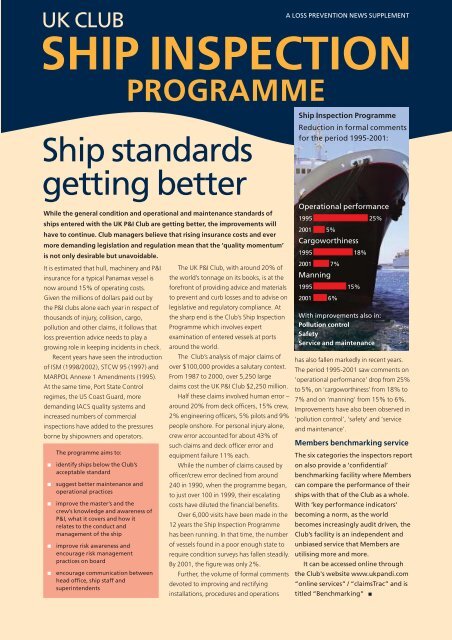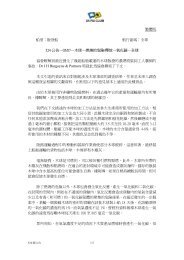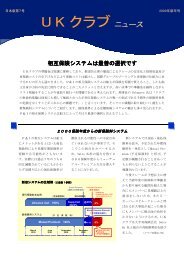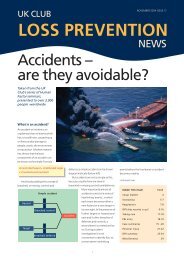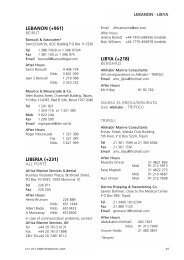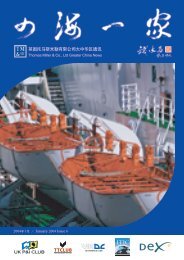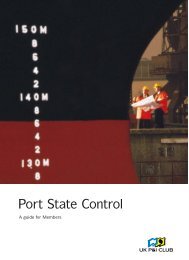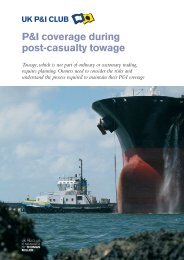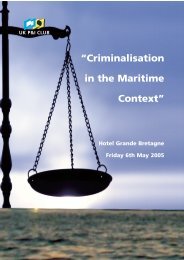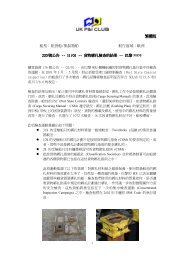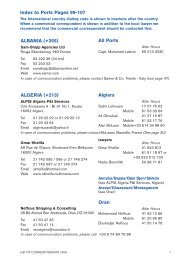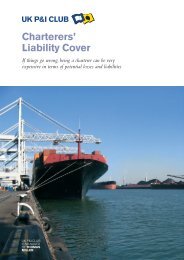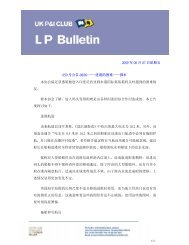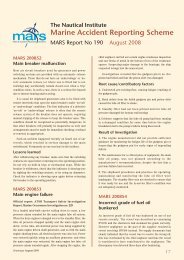Ship Inspection Programme - UK P&I Members Area
Ship Inspection Programme - UK P&I Members Area
Ship Inspection Programme - UK P&I Members Area
You also want an ePaper? Increase the reach of your titles
YUMPU automatically turns print PDFs into web optimized ePapers that Google loves.
<strong>UK</strong> CLUB<br />
A LOSS PREVENTION NEWS SUPPLEMENT<br />
SHIP INSPECTION<br />
PROGRAMME<br />
<strong>Ship</strong> standards<br />
getting better<br />
While the general condition and operational and maintenance standards of<br />
ships entered with the <strong>UK</strong> P&I Club are getting better, the improvements will<br />
have to continue. Club managers believe that rising insurance costs and ever<br />
more demanding legislation and regulation mean that the ‘quality momentum’<br />
is not only desirable but unavoidable.<br />
It is estimated that hull, machinery and P&I<br />
insurance for a typical Panamax vessel is<br />
now around 15% of operating costs.<br />
Given the millions of dollars paid out by<br />
the P&I clubs alone each year in respect of<br />
thousands of injury, collision, cargo,<br />
pollution and other claims, it follows that<br />
loss prevention advice needs to play a<br />
growing role in keeping incidents in check.<br />
Recent years have seen the introduction<br />
of ISM (1998/2002), STCW 95 (1997) and<br />
MARPOL Annexe 1 Amendments (1995).<br />
At the same time, Port State Control<br />
regimes, the US Coast Guard, more<br />
demanding IACS quality systems and<br />
increased numbers of commercial<br />
inspections have added to the pressures<br />
borne by shipowners and operators.<br />
■<br />
■<br />
■<br />
■<br />
■<br />
The programme aims to:<br />
identify ships below the Club’s<br />
acceptable standard<br />
suggest better maintenance and<br />
operational practices<br />
improve the master’s and the<br />
crew’s knowledge and awareness of<br />
P&I, what it covers and how it<br />
relates to the conduct and<br />
management of the ship<br />
improve risk awareness and<br />
encourage risk management<br />
practices on board<br />
encourage communication between<br />
head office, ship staff and<br />
superintendents<br />
The <strong>UK</strong> P&I Club, with around 20% of<br />
the world’s tonnage on its books, is at the<br />
forefront of providing advice and materials<br />
to prevent and curb losses and to advise on<br />
legislative and regulatory compliance. At<br />
the sharp end is the Club’s <strong>Ship</strong> <strong>Inspection</strong><br />
<strong>Programme</strong> which involves expert<br />
examination of entered vessels at ports<br />
around the world.<br />
The Club’s analysis of major claims of<br />
over $100,000 provides a salutary context.<br />
From 1987 to 2000, over 5,250 large<br />
claims cost the <strong>UK</strong> P&I Club $2,250 million.<br />
Half these claims involved human error –<br />
around 20% from deck officers, 15% crew,<br />
2% engineering officers, 5% pilots and 9%<br />
people onshore. For personal injury alone,<br />
crew error accounted for about 43% of<br />
such claims and deck officer error and<br />
equipment failure 11% each.<br />
While the number of claims caused by<br />
officer/crew error declined from around<br />
240 in 1990, when the programme began,<br />
to just over 100 in 1999, their escalating<br />
costs have diluted the financial benefits.<br />
Over 6,000 visits have been made in the<br />
12 years the <strong>Ship</strong> <strong>Inspection</strong> <strong>Programme</strong><br />
has been running. In that time, the number<br />
of vessels found in a poor enough state to<br />
require condition surveys has fallen steadily.<br />
By 2001, the figure was only 2%.<br />
Further, the volume of formal comments<br />
devoted to improving and rectifying<br />
installations, procedures and operations<br />
<strong>Ship</strong> <strong>Inspection</strong> <strong>Programme</strong><br />
Reduction in formal comments<br />
for the period 1995-2001:<br />
Operational performance<br />
1995 25%<br />
2001 5%<br />
Cargoworthiness<br />
1995 18%<br />
2001 7%<br />
Manning<br />
1995 15%<br />
2001 6%<br />
With improvements also in:<br />
Pollution control<br />
Safety<br />
Service and maintenance<br />
has also fallen markedly in recent years.<br />
The period 1995-2001 saw comments on<br />
‘operational performance’ drop from 25%<br />
to 5%, on ‘cargoworthiness’ from 18% to<br />
7% and on ‘manning’ from 15% to 6%.<br />
Improvements have also been observed in<br />
‘pollution control’, ‘safety’ and ‘service<br />
and maintenance’.<br />
<strong>Members</strong> benchmarking service<br />
The six categories the inspectors report<br />
on also provide a ‘confidential’<br />
benchmarking facility where <strong>Members</strong><br />
can compare the performance of their<br />
ships with that of the Club as a whole.<br />
With ‘key performance indicators’<br />
becoming a norm, as the world<br />
becomes increasingly audit driven, the<br />
Club’s facility is an independent and<br />
unbiased service that <strong>Members</strong> are<br />
utilising more and more.<br />
It can be accessed online through<br />
the Club's website www.ukpandi.com<br />
“online services” / “claimsTrac” and is<br />
titled “Benchmarking” ■<br />
2
What the inspectors said<br />
Cargoworthiness<br />
Cargo accounts for around 40% of the Club’s large claims. While there is a clear<br />
downward trend in such claims – from 193 valued at $53 million in 1995 to 98<br />
worth $30 million in 1999 – the sheer scale means the area demands the closest<br />
attention from the inspectors.<br />
In 2001, one ship in ten incurred comments on cargoworthiness, half the<br />
level of 1995. These encompassed securing and hatch packing (12% each),<br />
covers/pontoons, cross joints and compression bars (8% each), packing channel<br />
and access hatches (7% each), lifting gear (6%) and container lashing,<br />
ventilators, coamings, drain valves and hydraulics.<br />
Manning<br />
The STCW 95 amendments of February 1997 helped push comments made up to<br />
22% of visits as inspectors drew masters’ attention to the higher standards<br />
required. However, this was followed by a steady reduction, indicating good<br />
progress towards the 2002 deadline for further STCW 95 amendments.<br />
Pollution<br />
Pollution accounts for only 5% of the Club’s large claims by number but 17% by<br />
value. In 1996-97, comments made reached around 20% of visits. This coincided<br />
with MARPOL Annex 1 Amendments coming into force, requiring all ships to<br />
have a shipboard oil pollution emergency plan (SOPEP). Oil leaks and SOPEPS<br />
accounted for half the pollution comments in the seven-year period 1995-2001.<br />
Encouragingly, the volume of comment has halved in the past four years.<br />
Technical<br />
bulletins<br />
Another service provided by the Loss<br />
Prevention department is ‘Technical<br />
Bulletins’. Following on from the successful<br />
‘Good Practice’ posters the inspectors are<br />
using the Club's claims experience with<br />
their own onboard experience to highlight<br />
current technical problems influencing P&I<br />
claims. These are more detailed than the<br />
posters and hopefully provide a source of<br />
information the shipowner can use in his<br />
own loss prevention programmes.<br />
The Club's LP programme remains<br />
firmly committed to providing material to<br />
raise awareness, a selection of which the<br />
Member can tailor to his own needs. The<br />
bulletins are not provided in paper form<br />
but electronically (pdf format) and on<br />
demand. <strong>Members</strong> wishing to be put on<br />
the mailing list, should contact<br />
karl.lumbers@thomasmiller.com ■<br />
Operations<br />
Operational performance deficiencies have concerned auto pilot, echo sounder,<br />
radio equipment, main propulsion and bow thruster not working; hatch closing<br />
device problems; spare gear shortage and detention by Port State Control. The<br />
period also saw a steady reduction in such comments.<br />
Service and maintenance<br />
Standards of service and maintenance have come under increasing scrutiny<br />
because of the impact of cost saving measures, particularly the widespread<br />
deployment of smaller and cheaper crews. A trend towards major maintenance<br />
work being done during mandatory drydock periods has been associated with a<br />
downward trend in the use of riding crews.<br />
In the past five years, formal comments have fallen very slightly to around<br />
15% of visits. The update of nautical publications and charts and problems with<br />
bridge and pilotage procedures accounted for more than half of comments in<br />
this area. Clearly there is still room for improvement.<br />
Safety<br />
Engine room safety and fire hazards attracted 24% of comments, safety<br />
procedures 19% and fire-fighting equipment 14%. According to the report:<br />
“Most comments relate to factors known to the crew – the people most likely to<br />
suffer the consequences of accidents caused by deficiencies. A culture of safety<br />
awareness still seems to be a challenge for many crews.”<br />
<strong>UK</strong> Club Loss Prevention Director Karl Lumbers explained: “These seven-year<br />
trends provide indications of positive developments in the quality of the Club’s<br />
entered tonnage. However, there remains plenty of room for improvement, not<br />
least in cargoworthiness, where better measures are sometimes quite easy to put<br />
into effect, and in personal safety where the consequences of unsafe<br />
installations and practices can be massive.”<br />
Does anyone<br />
love an<br />
inspector?<br />
Hopefully the Club's claims handlers do.<br />
Digital photographs of over 1,400 ships<br />
taken by inspectors are now available on<br />
the electronic claims handling system<br />
(Oasis).<br />
This enables them to have immediate<br />
access to general shots of the ships<br />
when opening a claims file, giving them a<br />
visual idea of the type of ship they are<br />
dealing with ■
When ship<br />
inspectors call<br />
The <strong>UK</strong> P&I Club’s <strong>Ship</strong> <strong>Inspection</strong><br />
<strong>Programme</strong> depends on a handful of<br />
dedicated former ship masters determined<br />
to help owners and masters towards safe<br />
working practices which in turn enhance<br />
the overall quality of the entered fleet.<br />
The inspectors’ reports provide broad<br />
information about vessel condition,<br />
operational practice, cargoworthiness,<br />
crew experience and training, safety<br />
practice and pollution control. However,<br />
their role is essentially an advisory one and<br />
very different from the highly formalised<br />
requirements of official bodies. They are<br />
the Club’s own inspectors.<br />
Between 1990 and 2001, the number<br />
of ships the inspectors found<br />
“unacceptable to Club standards” fell<br />
from 12% to 2%. The fall has been<br />
accompanied by a shift away from<br />
‘policing’ to giving advice on risk awareness<br />
and risk management.<br />
<strong>Inspection</strong>s, which take around four<br />
hours, also relate closely to official<br />
requirements, such as Standards of<br />
Training and Certification of<br />
Watchkeeping, the International Safety<br />
Management Code, SOLAS and MARPOL.<br />
Pre-empting what the authorities are likely<br />
to pick up is a major consideration.<br />
There are two key questions for an<br />
inspector:<br />
■ Is the ship acceptable by <strong>UK</strong> Club<br />
standards?<br />
■ Would he sail on this ship without<br />
reservation under its present<br />
management?<br />
Bases in Rotterdam and Houston are<br />
permanently manned as these centres<br />
see as much shipping as anywhere.<br />
However, the inspectors have to follow the<br />
fleets as well.<br />
There are grain carrying bulkers at<br />
Buenos Aires in February and at Seattle in<br />
October, while Miami is suitable all year<br />
round for cruise ships. Reefers are<br />
generally inspected in Western Europe<br />
where so many unload. Durban, Newcastle<br />
(New South Wales) and Dampier (Western<br />
Australia) are favoured locations for bulker<br />
inspection.<br />
The <strong>UK</strong> Club inspectors are all former<br />
masters with great diversity of experience.<br />
All have held senior management positions<br />
with shipping operations and are qualified<br />
ISO 9000 and ISM lead auditors.<br />
They take into account the general<br />
appearance of the vessel and broad<br />
considerations such as company policies<br />
and communications between ship and<br />
shore personnel. There is a particular focus<br />
on manning, officers’ and crews’<br />
knowledge of the ship, bridge equipment<br />
and procedures, engine room and steering<br />
gear, safety, lifesaving and firefighting<br />
aspects, pollution, cargo/ballast system and<br />
mooring equipment. Emphases vary<br />
between major vessel types.<br />
Captain David Wright, one of the <strong>UK</strong><br />
Club’s longest serving ship inspectors,<br />
explains: “We walk around the deck and<br />
look into the cargo areas, consider<br />
accommodation, living and working<br />
conditions and check diagrams and other<br />
displayed information designed to improve<br />
best and safe practice. The language mix is<br />
important. Where vessels are likely to call<br />
at a range of international ports, a<br />
working knowledge of English for the<br />
officers is almost essential for dealing with<br />
procedures and emergencies.<br />
“We listen particularly carefully to<br />
masters’ and chief engineers’ problems<br />
and sometimes act as sounding boards for<br />
items they are considering raising with<br />
their companies. We offer various<br />
on-the-spot assistance, some of which may<br />
have little or nothing to do directly with<br />
the inspection.<br />
“Many masters feel unfairly put upon<br />
by paperwork,” continues Captain<br />
Wright. “ISM, GMDSS and increased use<br />
of third party crewing companies have<br />
been responsible for significant extra<br />
paperwork in recent years. So much falls<br />
back onto the master in the broad context<br />
of insufficient officers with insufficient<br />
training.<br />
“We play a valuable role in reminding<br />
masters that the smallest oversight or<br />
slack practice can lead to an expensive<br />
claim. We are not trying to trip people up<br />
but to promote awareness among<br />
masters and crews. We are always looking<br />
at areas which could be improved.<br />
Sometimes, we see good ideas being put<br />
into practice and advise other ships to<br />
consider them.”<br />
After each visit, the inspectors write to<br />
the Member outlining the findings and<br />
recommending remedial measures as<br />
appropriate.<br />
Captain Wright concludes: “Safety is a<br />
passion with all the inspectors. We are<br />
seamen first and inspectors second.<br />
Having inspected over 6,000 ships in the<br />
last twelve years, the team has a unique<br />
overview of working practices among<br />
Club <strong>Members</strong>. However, we cannot<br />
afford to be complacent about the<br />
problems even if we’ve seen nearly all of<br />
them before. Our whole approach is to<br />
assist the master, crew and Member.” ■<br />
Photos on this page courtesy of Lloyd’s List
Posters<br />
popular with<br />
<strong>Members</strong><br />
A series of 23 ‘Good Practice’ posters,<br />
produced in 2002 by the <strong>UK</strong> Club to<br />
encourage a safety and loss prevention<br />
culture aboard ship, has been well received<br />
by owners, operators and other maritime<br />
organisations.<br />
They reflect the observations and<br />
opinions of the <strong>UK</strong> Club’s ship inspection<br />
team, contrasting good and bad practice in<br />
key operational<br />
areas. Photographs<br />
taken by inspectors<br />
are supported by<br />
advisory comments<br />
and exhortations,<br />
presented through<br />
cartoon images of an<br />
albatross, the seabird<br />
most commonly<br />
associated with safe<br />
voyages by ancient and modern mariners.<br />
The English language posters cover<br />
grinders, fire doors and fire hose storage,<br />
liferafts, coaming drains, bilges, garbage,<br />
gangways, access/hazard markings,<br />
oxygen and acetylene treatment, sight<br />
glasses, paint locker storage, sounding<br />
pipes, safety harnesses, twistlocks, mob<br />
lights, hatch cleats and vents, cargo hold<br />
access, main engine, steering gear and<br />
swimming pools.<br />
<strong>Members</strong> and their representatives in<br />
18 countries have asked for more sets.<br />
Correspondents say they have found the<br />
posters valuable and<br />
impressive.<br />
A Greek shipping<br />
organisation<br />
described the posters<br />
as: “an excellent job,<br />
easily understood by<br />
ships’ officers and<br />
crew and a valuable<br />
guide to minimising<br />
deficiencies and<br />
accidents onboard.” A ship management<br />
company wrote: “we congratulate your<br />
ship inspection team for a very appropriate<br />
and good effort in putting across very<br />
common deficiencies.” ■<br />
...............................................................................................................................................................................................................................................................................................<br />
It could only<br />
happen to<br />
a ship<br />
inspector…<br />
Excuse the pun, but the life of a ship<br />
inspector is not always plain sailing.<br />
The Club’s inspectors sometimes find<br />
themselves dealing with dangers and<br />
unexpected incidents arising from the most<br />
unusual sources. Some of these trials and<br />
tribulations follow.<br />
First, find your ship<br />
Finding a ship is not always as easy as you<br />
might think. With experience, a ship<br />
inspector builds up a pretty good mental<br />
database of locations and landmarks, not<br />
to mention a sense of humour when<br />
agents’ directions land him yet again at the<br />
dead end of many a dirt track in the middle<br />
of nowhere. But until that database is well<br />
on its way, locating a berth in the more<br />
obscure ports can be frustrating to say<br />
the least.<br />
On one occasion, a <strong>UK</strong> Club inspector<br />
took two trains, a flight, a bus, a<br />
hovercraft, another bus, a taxi and a<br />
launch before he finally reached the ship –<br />
and all this without being able to speak the<br />
local language!<br />
Indiana Jones?<br />
Moreover, journeys can be fraught with<br />
hazards. Imagine being dumped into the<br />
sea whilst boarding a ship or being tipped<br />
off an accommodation ladder into the<br />
Mississippi. And how scared would you be if<br />
you were shot at whilst travelling in a car in<br />
Venezuela or facing a weekend in a<br />
Louisiana jail?<br />
One of the Club’s inspectors has<br />
experienced all these setbacks in the line of<br />
duty. He has also had to chip ice from the<br />
upper works of a launch to maintain<br />
stability when going offshore from the US<br />
East Coast. He had to abandon a plane<br />
when part of the wing was ripped off by a<br />
fuel tanker. He’s been accused of spying,<br />
twice, had his accelerator jam, twice, in<br />
traffic and suffered numerous attacks of<br />
food poisoning.<br />
He has been severely interrogated by<br />
Canadian Immigration on suspicion of<br />
working without a permit and faced a US<br />
policeman with a drawn gun accusing him<br />
of doing a drug deal, when he was simply<br />
driving slowly trying to attract the<br />
attention of a pedestrian to ask directions.<br />
All this is on top of all the other minor<br />
irritations that go hand-in-hand with doing<br />
a job, alone, in unfamiliar surroundings.<br />
The canine factor<br />
Coming face-to-face with the ship’s canine<br />
occupant is one aspect of the inspectors’<br />
work that puts them in a league with<br />
postmen and milkmen. According to one<br />
severely threatened inspector: “far be it<br />
from us to suggest that the animal is<br />
primed ready to make our visit as<br />
unpleasant as possible in the hope that it<br />
will be as short as possible. Given that all of<br />
us have sailed as masters ourselves, we<br />
have a fair idea of the drill! It is usually the<br />
dog that can jump no higher than your<br />
knee that makes the most noise and snarls<br />
to greatest effect. We’re almost<br />
disappointed to find not a Doberman but a<br />
Yorkshire Terrier!”
Mrs Master<br />
Incurring the wrath of the master’s wife is<br />
another positive factor in the inspectors’<br />
argument for danger money. Explained<br />
one inspector: “not only are we seen to be<br />
taking up more of the master’s precious<br />
free time in port (of which we are very<br />
conscious) but a visit is often seen more as a<br />
ploy by the master to avoid his wife’s long<br />
anticipated visit to the shopping mall to<br />
spend more of his hard-earned wages!”<br />
Have you seen my laundry?<br />
On one occasion, the master received a<br />
stern reprimand from his wife for<br />
unwittingly showing the inspector to a<br />
spare cabin (for the purpose of changing<br />
into a boilersuit) that was being used as a<br />
drying room and was festooned with wet<br />
lingerie.<br />
Tackling marine criminals<br />
Because all the <strong>UK</strong> Club’s ship inspectors<br />
have served as masters at sea and held<br />
senior shipping positions ashore, they often<br />
find they are able to offer advice on other<br />
operational matters. Their experience can<br />
sometimes assist in deterring or detecting<br />
criminal activity that could result in<br />
considerable expense for both the<br />
<strong>Members</strong> and the Club.<br />
Artistic licence<br />
A Club inspector happened to be visiting<br />
two passenger ships in the same pier at the<br />
same port on the same day. He boarded the<br />
first ship shortly after it docked at the end<br />
of one cruise and during preparations for<br />
the start of the next. Passengers were<br />
disembarking and the crew were busy with<br />
the numerous duties associated with a<br />
quick turnaround.<br />
Meeting with the staff captain in the<br />
ship’s office, the inspector witnessed a<br />
scene. An artist was alleging in a most<br />
aggressive manner that his most expensive<br />
painting – supposedly worth $70,000 – had<br />
been stolen from his cabin during an<br />
auction of his works. The inspector<br />
thought it strange that the artist would<br />
leave his most expensive painting in his<br />
cabin during the auction when it would<br />
have been an ideal time to try to sell it. And<br />
how convenient to discover the painting<br />
was missing when half the passengers had<br />
already left the ship, therefore making a<br />
search of departing passengers a<br />
potentially fruitless exercise? However,<br />
ship inspectors do not interfere in<br />
shipboard incidents unless requested by<br />
the master, so the inspector left.<br />
In discussions with the master of the<br />
second vessel, the subject of the artist<br />
came up. To the inspector’s surprise,<br />
both master and staff captain had<br />
experienced similar incidents on other<br />
voyages. The inspector’s description of the<br />
artist matched that in the other incidents.<br />
The operator of both ships was<br />
immediately informed so that he could deal<br />
with the matter.<br />
Crew morale<br />
From <strong>UK</strong> Club ship inspectors’ reports over<br />
the years, a common thread has emerged:<br />
when the toilets still flush and washrooms<br />
are hygienic, and when plants or flowers<br />
are being grown onboard, you have a<br />
happy ship. In about 85% of the cases<br />
where these conditions are not met, there<br />
are other operational areas in which<br />
attention is required. Coincidence?<br />
Maybe. But whilst owners may not instruct<br />
their masters to buy packets of seed, plant<br />
pots and bags of compost, there is certainly<br />
no harm in getting the toilets fixed! ■
Safer and smarter<br />
Based on widespread experience,<br />
the <strong>UK</strong> Club inspectors offer the<br />
following advice and suggestions in<br />
the interests of safety, operations and<br />
maintenance.<br />
Q: Why should the engine room<br />
double bottom sounding pipes be kept<br />
closed?<br />
Q: Why should the door to the steering<br />
gear space from the engine room be<br />
kept closed at all times?<br />
A: To restrict any fire in the engine room.<br />
Most steering gear spaces are not included<br />
in the calculation of the quantity of fixed<br />
fire fighting medium used in the engine<br />
room. Escape of this medium (CO 2<br />
, Halon)<br />
into the steering room would dilute the<br />
effect in the engine room. On older ships,<br />
there is often direct access from the<br />
steering gear room into accommodation or<br />
onto the poop.<br />
A: Although these important safety<br />
devices should remain closed at ALL times<br />
except for routine soundings, the<br />
‘deadman’ weight is frequently removed<br />
or reversed, leaving the automatic closing<br />
device open. The duty oiler usually does<br />
this as he cannot see why this ‘annoying’<br />
lever should hamper his regular sounding<br />
of compartments. Sometimes, sounding<br />
rods or filter funnels are left inside open<br />
sounding pipes for ease of operation,<br />
leading to all sorts of potentially hazardous<br />
situations, such as engine room flooding,<br />
flash fire and sinking.<br />
Q: Why do engine room ventilator<br />
intake dampers frequently seize?<br />
A: They are usually left in the open position<br />
under normal operational conditions.<br />
Move them every week.<br />
Q: What attention should be paid to<br />
engine room gantry cranes?<br />
A: <strong>Ship</strong> personnel sometimes overlook the<br />
need to examine and certify lifting<br />
appliances onboard on a regular basis.<br />
Consult the ‘Register of Lifting Appliances<br />
and Cargo Handling Gear Book’.<br />
Q: What happens to visibility when CO 2<br />
is released in the engine room?<br />
A: Since it is cold, it forms a dense fog-like<br />
effect. Highlight exit/access doors to make<br />
them easily distinguishable from<br />
surrounding paintwork, which is usually<br />
white/light coloured.<br />
Q: What could be the quickest, easiest<br />
way to remove an injured person from<br />
the engine room?<br />
A: By stretcher lifted up the escape trunk.<br />
Fit an eye pad and lift block at the top.<br />
Q: What is one of the quickest, easiest<br />
and most practical ways of boarding a<br />
forward stowed life raft?<br />
A: By knotted ‘jumping rope’, similar to<br />
those on open lifeboats davits.<br />
Q: Why should oil tank gauge cocks not<br />
be jacked or locked open?<br />
A: If the glass breaks, you lose all the oil,<br />
which is very expensive. If it breaks during a<br />
fire, you add fuel to the conflagration.<br />
Q: What item seizes most frequently<br />
on the forecastle?<br />
A: The windlass brake hinge pins. Seizure<br />
can reduce brake holding power by up to<br />
30%. Replace mild steel pins with stainless<br />
steel ones, preferably with greasing<br />
facility. Keep the hinge protected from<br />
seawater ingress by white lead and<br />
tallow.<br />
Q: Why should there be clear<br />
highlighting around the vessel?<br />
A: An estimated 45% of slips and falls<br />
could be avoided if steps, ladders and<br />
companionways have the bottom and top<br />
steps highlighted.<br />
Q: Why should there be exit and<br />
direction arrow signs at low levels in<br />
accommodation alleyways?<br />
A: Alleyways can fill with smoke in a fire.<br />
People inside are more likely to be<br />
crawling at deck level than walking<br />
upright.<br />
Q: What is one of the best ways of<br />
being seen in a dark / smokey place?<br />
A: Retro reflective tape. Fit strips on<br />
breathing apparatus cylinders,<br />
emergency lamps and firemen’s suits.<br />
Q: Why should safety shower and eye<br />
wash areas be highlighted with<br />
fluorescent or ‘tiger’ stripes?
A: If you have chemicals in your eyes or<br />
face, your eyes may be streaming with<br />
tears. It may be difficult to see where<br />
the emergency eyewash or shower is<br />
located unless it is a different and highly<br />
visible colour. Most chemical ships have<br />
orange painted decks to help ‘tiger’ stripes<br />
stand out.<br />
Q: Why should there be non-slip<br />
coatings around certain deck areas?<br />
A: They can be slippery when wet,<br />
increasing chances of slips and falls. The<br />
most likely places are around manifolds on<br />
tankers, mooring decks, at the base of<br />
ladders and at ship entry points. These<br />
include pilot boarding area, gangways,<br />
abandon ship stations (boat deck) and<br />
outside watertight doors.<br />
Q: What is one of the most frequent<br />
times for pilots to board?<br />
A: Early morning about 0600 hours when<br />
decks are often wet with overnight dew/<br />
condensation. To minimise tripping<br />
hazards, make an extra rough non-skid<br />
painted walkway from the pilot boarding<br />
area to the accommodation.<br />
Q: Why should a written record of the<br />
ship’s position be kept in a book during<br />
pilotage passages?<br />
A: Apart from forming part of the record<br />
of the whole of the ship’s passage, this is<br />
the only way of proving a ship’s position<br />
and speed over the ground. Wash damage<br />
claims can be very expensive, so being able<br />
to prove correct speed is vital to any<br />
defence.<br />
Q: Why should fire, damage and<br />
ventilation control plans be placed on<br />
the bridge?<br />
A: The command and control teams are<br />
based on the bridge and may need to refer<br />
to such plans during emergencies.<br />
Q: Why should GMDSS radios not be<br />
used for routine operations like<br />
bunkering or mooring?<br />
A: If GMDSS VHF radios were to be<br />
damaged during these operations, a PSC<br />
or USCG officer conducting a routine PSC<br />
inspection might feel the vessel was not<br />
complying with SOLAS regulations and<br />
prohibit her from sailing until replacement<br />
units were supplied.<br />
Q: Why should there be an<br />
‘English only’ day?<br />
A: As English remains the main<br />
international marine language, masters<br />
and officers have to use it in many<br />
situations. In ships manned by one<br />
nationality whose primary language is not<br />
English, officers and crew may lose<br />
proficiency in English. One day per week<br />
(at least) when everybody has to try<br />
speaking English only would assist ship to<br />
shore and other international<br />
communications ■<br />
...............................................................................................................................................................................................................................................................................................<br />
Concerns<br />
over STCW<br />
standards<br />
Inspectors have become concerned<br />
about STCW ’95 implementation,<br />
particularly the lack of uniformity<br />
between flags and differing levels of crew<br />
competence.<br />
STCW regulations are designed to<br />
standardise qualifications and training of<br />
crews and to regulate work and rest<br />
periods for watchkeepers – but notably<br />
not masters. It follows that certificates<br />
are supposed to have the same standing.<br />
Unfortunately, <strong>UK</strong> Club inspectors<br />
have found disparities between flag<br />
states in the real standards required to<br />
obtain training course certificates. This<br />
tends to devalue certificates issued by<br />
stricter training establishments.<br />
Nor does an STCW training course<br />
certificate necessarily reflect the<br />
practical ability of the holder. Even where<br />
some crews have undergone the<br />
necessary training, there may still be a<br />
lack of sound basic seamanship and<br />
navigational knowledge and ability.<br />
Inspectors’ questioning has shown up<br />
considerable differences in individuals’<br />
knowledge.<br />
Fatigue is clearly a problem in relation<br />
to watchkeeping. Although no one<br />
admits to failing to comply with the<br />
required rest/work rotation periods,<br />
inspectors often board ships where the<br />
situation is clearly unsatisfactory. For<br />
example, a watchkeeping master may be<br />
almost ‘dead on his feet’ after a long,<br />
sometimes fog-bound trip up the English<br />
Channel or along the North European<br />
coast in winter.<br />
When added to the extra strains of<br />
pilotage (usually in accordance with<br />
SMS/ISM requirements), this makes for<br />
unacceptable fatigue – and increases the<br />
possibilities of incidents.<br />
Although apprentices sometimes keep<br />
watch to enable officers to obtain some<br />
sleep, it would be a very brave master<br />
who would stop his ship’s operation<br />
because he and his officers had not had<br />
enough rest ■
Keeping ahead<br />
of Port State Control<br />
Time and time again, the <strong>UK</strong> Club’s<br />
inspectors see vessels adversely<br />
commented on and detained by Port State<br />
Control officers for deficiencies which<br />
could easily have been rectified in advance.<br />
Most onboard deficiencies do not occur<br />
overnight. They are often the result of long<br />
periods of neglect.<br />
Port State Control officers have a<br />
better working knowledge of marine rules<br />
and regulations than most masters –<br />
particularly the SOLAS and STCW<br />
conventions. So, when fire dampers are<br />
found to be inoperative or fire hose nozzles<br />
seized through lack of maintenance,<br />
blaming the third mate or whoever is<br />
responsible for maintaining fire fighting<br />
equipment and life saving apparatus cuts<br />
no ice with PSC.<br />
A physical check is always better than<br />
accepting a checklist at face value. Senior<br />
officers must set aside time to ensure that<br />
work reportedly carried out has been<br />
completed.<br />
The <strong>UK</strong> Club has found that the main<br />
areas where PSC detention is incurred are<br />
fire dampers/flaps; emergency fire pumps;<br />
lifeboats, hull and engines; launching<br />
arrangements; ship certificates; charts and<br />
nautical publications; fire fighting<br />
equipment; and oily water separators.<br />
Accordingly, Club inspectors focus on<br />
areas where they are sure PSC in<br />
particular countries will look for<br />
deficiencies and faults. Over the years,<br />
they have helped resolve many problems<br />
recorded during PSC inspections and<br />
helped ships to avoid future difficulties.<br />
An inspector who boarded a ship, just<br />
as the US Coast Guard had asked for a fire<br />
drill, described what followed as a<br />
“circus”. He commented: “the only two<br />
people who knew how to wear the<br />
breathing apparatus were ashore. The<br />
fire hose party were pointing their<br />
hoses – which had very little water<br />
pressure – over the side when a small fire<br />
had been started in an oil drum which they<br />
were supposed to extinguish. And so it<br />
went on.”<br />
The inspector’s offer to spend the next<br />
six hours teaching emergency drills to ship<br />
personnel was accepted and the Coast<br />
Guard agreed to return the following day<br />
to re-test the crew rather than issue a<br />
detention order immediately. Both crew<br />
and master were then subject to intensive<br />
training about procedures which had<br />
never before been explained to them.<br />
They got through the next USCG visit<br />
without problems.<br />
Another ship was detained because<br />
the flame screens on the oil tank vents<br />
were wasted away and needed replacing<br />
prior to sailing. The master told a Club<br />
inspector it was a “dry dock job”,<br />
reckoning the authorities would let him<br />
sail on completion of cargo. When they<br />
would not, the inspector managed to find<br />
a couple of flour sieves from the galley.<br />
These were cut up and installed to the<br />
satisfaction of the PSC inspector! ■<br />
...............................................................................................................................................................................................................................................................................................<br />
Not plain<br />
sailing for ISM<br />
The introduction of the ISM Safety Code<br />
has coincided with an improvement in<br />
safety awareness and in liaison between<br />
ship and shore bases with beneficial effects<br />
on delivery of parts and supplies.<br />
However, <strong>UK</strong> Club inspectors have<br />
found drawbacks. There is evidence of<br />
differing audit standards among the<br />
various authorities (usually Class) who issue<br />
and validate Safety Management<br />
Certificates.<br />
Even on ISM certificated ships, they<br />
have come across instances of falsification<br />
of documents associated with ISM.<br />
Examples have included sailing/departure<br />
lists completed shortly after a ship has<br />
berthed; and confirmation that enclosed<br />
spaces atmospheres have supposedly been<br />
tested when the ship did not have<br />
instruments to measure the oxygen<br />
content.<br />
Time constraints and poor crew<br />
training may have contributed to these<br />
shortcomings.<br />
The inspectors feel ISM should be seen<br />
in the context of the loss of the radio<br />
officer post from most ships. This has<br />
meant an increase in time spent by masters<br />
on communications and administrative<br />
matters. “Too much paperwork – not<br />
enough time to spend on our proper jobs”<br />
is a familiar cry ■<br />
Contributors:<br />
Capt JG Cummins<br />
Capt PJ Denny<br />
Capt LJ Hesketh<br />
Capt CJ Roberts<br />
Capt DH Wright<br />
For further information contact:<br />
Karl Lumbers, Loss Prevention Director<br />
Thomas Miller P&I Ltd<br />
International House, 26 Creechurch Lane<br />
London EC3A 5BA<br />
Tel: +44 (0)20 7204 2307<br />
Fax: +44 (0)20 7283 6517<br />
e-mail: karl.lumbers@thomasmiller.com<br />
http://www.ukpandi.com<br />
14


